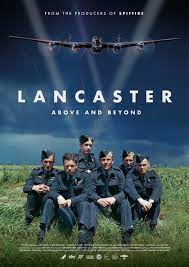
LANCASTER
UK, 2022, 110 minutes, Colour.
Directed by David Fairhead, Ant Palmer.
A very British documentary which will be of great interest to audiences who want to understand and appreciate the role of bombers in World War II. This warfare is now seen in the hindsight of almost 80 years.
One of the comments to make immediately is that there is an extraordinary amount of aerial photography, not only in the present, but in archival material from the war years and missions themselves. We are made participant in the flights, with the men, the night missions, the limitations of guidance technology, the experience of dropping the bombs, the explosions and devastation.
This is not a film about the detailed development of the Lancaster bombers. Rather, it does give background to the situation in the late 1930s, early 1940s, the design of planes, the building, the discovery of shortcomings – and the emergence of the Lancaster with explanations of why it was successful.
One of the great advantages of this film is the number of pilots and gunners who have been interviewed, several in their 90s, but still alert, delving into the memories, their experiences, their emotions, the realities of war. Most of them are British but there is an Australian and New Zealander or two and a pilot from Jamaica. They interview very well, articulate elderly men, reflective men, assessing what they did – and pondering the consequences, especially the destruction, but, more especially, the loss of lives, civilian lives (in Hamburg and, most tellingly, Dresden), as well as the high number of men who were killed in action, around 55,000.
One of the earliest features of this kind of warfare was Britain on the receiving end, especially during the Blitz. With the development of such planes as the Lancasters, the war was taken to the continent, against the Germans. One of the episodes that was immortalised in book and feature film in the 1950s was that of the Dam Busters, this documentary explaining the training, the targeting, the consequences (and also including clips from the film itself). There is also the attack on Hamburg and its munitions centres but also the consequences for civilians. We see the attacks, night and day, on Berlin. And, in February 1945, the attack on Dresden.
The men themselves raise the issues of the morality of this kind of bombing and the consequences for civilian deaths. There is also background commentary, with Charles Dance as narrator) on the responsibilities of those in charge of the RAF and Bomber Command, but, especially, the responsibilities of the politicians, notably Winston Churchill (with photos and clips of him, statues and images), and the accusation that he took responsibility for success in action but not for the consequences, the airmen feeling he turned his back on them.
One of the interesting features of the film with a great deal of footage is 1944, the role of Dwight Eisenhower, the Americans working with the British, the targets on 5 June 1944 and then, the aerial visuals of the vast fleet sailing towards the D-Day landing.
A very interesting documentary in itself – but, especially as a record of the veterans reminiscing, a collection of photo and movie clip visualising of the Lancaster and its missions.